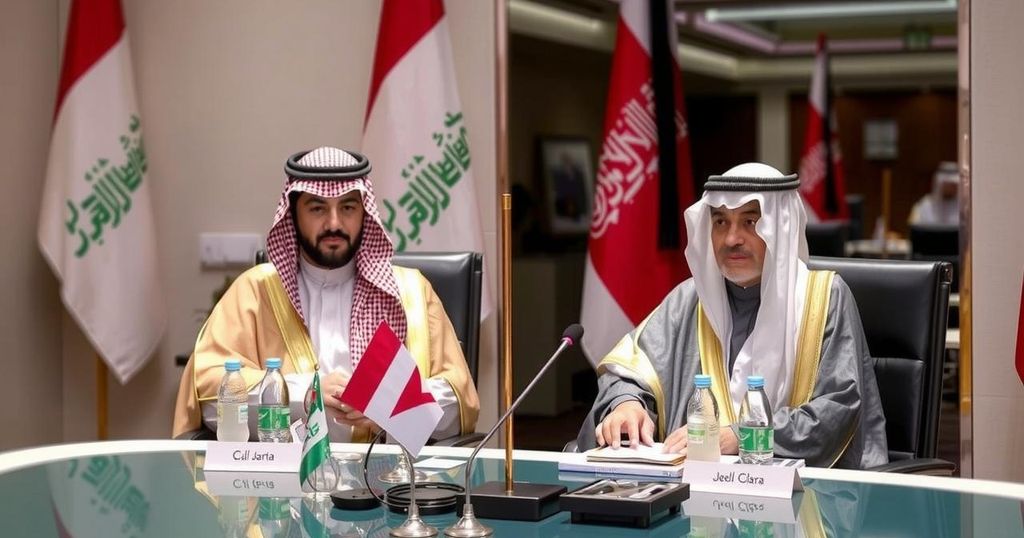Israeli Prime Minister Benjamin Netanyahu is sending the Mossad director to Qatar for ceasefire negotiations, signifying progress in talks on the Gaza conflict. There is pressure from the U.S. to reach a deal before January 20, amid a backdrop of high casualties in Gaza. Families of hostages plea for a resolution, while airstrikes continue to inflict civilian casualties, highlighting the urgent humanitarian crisis.
Israeli Prime Minister Benjamin Netanyahu has decided to send David Barnea, the director of the Mossad intelligence agency, to Qatar to participate in ceasefire negotiations regarding the ongoing war in Gaza. This announcement indicates progress in diplomatic efforts, with high-level officials involved in the discussions. The timing of Barnea’s travel remains unclear, but there is significant U.S. pressure to finalize an agreement before the presidential inauguration on January 20.
As negotiations unfold, a phased ceasefire is under consideration, with preliminary discussions focused on a partial hostage release in exchange for a temporary halt in hostilities. Hamas has stipulated a complete withdrawal of Israeli troops from the heavily damaged Gaza territory, while Netanyahu has emphasized the necessity of neutralizing Hamas’s military capabilities.
The Gaza Health Ministry reports that over 46,000 Palestinians have died in the conflict, with the toll mainly affecting women and children. Netanyahu’s office announced that additional Israeli officials, including the heads of the Shin Bet security agency and military advisers, would also join Barnea in Qatar. This decision followed consultations with Israel’s defense minister and security leadership.
The families of approximately 100 hostages, taken during the attack that initiated the war, are urging the Israeli government to secure their release. Amid concerns over the fate of the hostages, U.S. Secretary of State Antony Blinken expressed optimism about a potential agreement, emphasizing the anticipation of finalizing a deal before transitioning diplomatic efforts to the incoming Trump administration. Significant challenges remain in negotiations, particularly concerning the specifics of hostage releases and the extent of any Israeli military pullback from Gaza.
The situation on the ground in Gaza remains dire, with continued airstrikes resulting in civilian casualties. Reports indicate multiple fatalities from recent airstrikes targeting areas where displaced individuals have sought refuge. This reflects the increasingly complex humanitarian crisis unfolding in the region, as residents face immense suffering amid ongoing military operations.
Despite continued fighting, the diplomatic endeavors signify a critical juncture in addressing the humanitarian needs and security concerns associated with the prolonged conflict in Gaza.
The ongoing conflict between Israel and Hamas has escalated significantly since its outbreak, with devastating consequences for civilians, particularly in Gaza. The international community, including the United States, Egypt, and Qatar, has been working to mediate a ceasefire, though efforts have frequently stalled. In this context, high-level discussions involving Israeli intelligence and security officials signal a potential shift towards resolution, with increasing pressure to secure a deal for the hostages and facilitate humanitarian aid. The situation is further complicated by the demands of both parties, particularly concerning military considerations and the treatment of hostages, highlighting the intense struggle for peace in a deeply divided region. The rising death toll among Palestinians underscores the urgent need for an effective ceasefire and humanitarian intervention.
In conclusion, Israel’s decision to send the Mossad director and other high-ranking officials to Qatar demonstrates a renewed commitment to negotiating a ceasefire amid the ongoing conflict in Gaza. With significant pressure from the United States to reach an agreement before the presidential transition, a phased deal focusing on hostage releases and a temporary halt to hostilities remains under discussion. The conflict has led to an alarming humanitarian crisis, with countless civilian casualties that necessitate immediate international attention and support. As negotiations continue, the well-being of the hostages and the civilian population in Gaza is of utmost importance, reminding all parties involved of the critical human aspect of these diplomatic efforts.
Original Source: www.pbs.org






